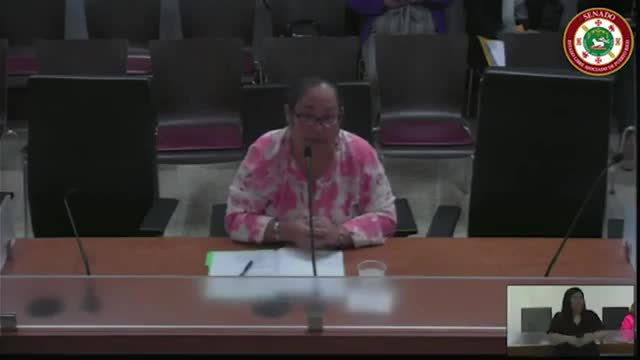Educators challenge claims of 85 percent readiness for technology in special education classrooms
January 25, 2024 | Senate, Committees, Legislative, Puerto Rico

This article was created by AI summarizing key points discussed. AI makes mistakes, so for full details and context, please refer to the video of the full meeting. Please report any errors so we can fix them. Report an error »

The Special Legislative Monitoring Commission for Education convened on January 25, 2024, to discuss the current state of teacher preparedness and the challenges faced in the education system. A significant point raised during the meeting was the claim that approximately 85% of teachers are now equipped with alternative teaching methods, particularly in technology use. However, several educators challenged this assertion, emphasizing the disparities in access to resources and training.
One teacher expressed frustration over the unrealistic expectations placed on educators, stating that not all teachers have the same level of comfort with technology. She highlighted the difficulties faced by special education teachers, who require tailored resources to effectively support their students. The teacher pointed out that while the goal is for all educators to be prepared, the reality is far from this ideal. She noted that many teachers are still struggling to adapt to new teaching methods and technologies, particularly after the disruptions caused by recent educational challenges.
Concerns were also raised about the adequacy of support from the Department of Education. The teacher recounted her experience with a student diagnosed with autism, who ultimately fell through the cracks of the system. She criticized the lack of empathy and responsiveness from the department, stating that the real issue lies not with the students but with the systemic failures that lead to high dropout rates.
The meeting underscored the need for better communication and collaboration between educational authorities and teachers on the ground. Educators called for more practical support and resources tailored to their specific needs, rather than relying solely on data-driven approaches that may not reflect the realities of classroom experiences.
In conclusion, the discussions highlighted a pressing need for the education system to address the gaps in teacher training and resource allocation, ensuring that all educators are truly prepared to meet the diverse needs of their students. The commission's findings will likely influence future policy decisions aimed at improving educational outcomes across the board.
One teacher expressed frustration over the unrealistic expectations placed on educators, stating that not all teachers have the same level of comfort with technology. She highlighted the difficulties faced by special education teachers, who require tailored resources to effectively support their students. The teacher pointed out that while the goal is for all educators to be prepared, the reality is far from this ideal. She noted that many teachers are still struggling to adapt to new teaching methods and technologies, particularly after the disruptions caused by recent educational challenges.
Concerns were also raised about the adequacy of support from the Department of Education. The teacher recounted her experience with a student diagnosed with autism, who ultimately fell through the cracks of the system. She criticized the lack of empathy and responsiveness from the department, stating that the real issue lies not with the students but with the systemic failures that lead to high dropout rates.
The meeting underscored the need for better communication and collaboration between educational authorities and teachers on the ground. Educators called for more practical support and resources tailored to their specific needs, rather than relying solely on data-driven approaches that may not reflect the realities of classroom experiences.
In conclusion, the discussions highlighted a pressing need for the education system to address the gaps in teacher training and resource allocation, ensuring that all educators are truly prepared to meet the diverse needs of their students. The commission's findings will likely influence future policy decisions aimed at improving educational outcomes across the board.
View full meeting
This article is based on a recent meeting—watch the full video and explore the complete transcript for deeper insights into the discussion.
View full meeting